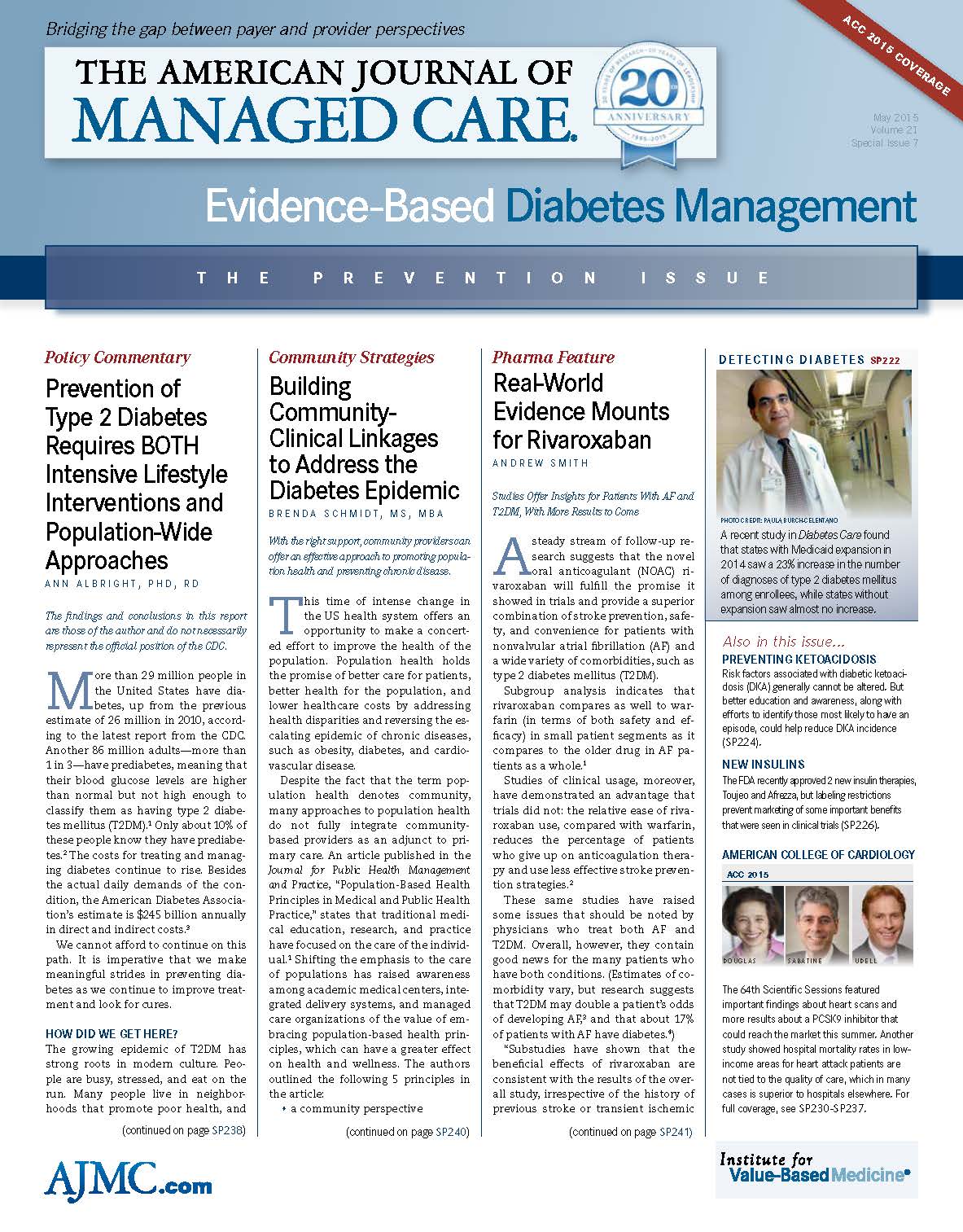- Center on Health Equity & Access
- Clinical
- Health Care Cost
- Health Care Delivery
- Insurance
- Policy
- Technology
- Value-Based Care
Losing Weight And Keeping it Off Can Free Patients From Atrial Fibrillation
Coverage from the 64th Scientific Sessions of the American College of Cardiology.
Maintaining weight loss offers many health benefits, and a study presented on March 16, 2015, at the 64th Annual Meeting of the American College of Cardiology added another item to the list: obese patients with atrial fibrillation are far more likely to rid themselves of this heart ailment if they shed pounds.
For obese patients, weight loss might require support, as researchers of the LEGACY (Long-Term Effect of Goal-Directed Weight Management on an Atrial Fibrillation Cohort) study concluded. Support is worth providing, because the study found that if patients lost at least 10% of their body weight, they were 6 times more likely to achieve arrhythmiafree survival.
The study, led by Rajeev Pathak, MD, a cardiologist and fellow in electrophysi-ology at the University of Adelaide, Aus-tralia, was the first study to outline the benefits of sustained weight loss, the ef-fects of the amount of weight lost, and the impact of changes in weight over time among patients who suffered from atrial fibrillation (AF). This condition causes shortness of breath and muscle weakness, and can indicate stroke risk. Treatment typically includes anticoagulants, which can present their own risks in some patients.
“We found that sustained weight loss is achievable in obese patients and that it can significantly reduce the burden of atrial fibrillation,” Pathak said. Previous studies had examined only the short-term effects of weight loss on AF.
LEGACY researchers enrolled 355 par-ticipants in a weight loss clinic that pro-vided support through 3 in-person visits a month, nutrition guidance, exercise, counseling and a physical activity diary. All participants were obese (with a body mass index of at least 27 kg/m2) and had AF at the start of the study, and all agreed to participate, which Pathak ac-knowledged does pose some limitations to the results. Subjects with permanent AF, previous AF ablation, and severe medical illnesses were excluded.
Each year for 4 years, participants re-ported for a health exam and an assessment of their AF symptoms, based on their own reports and 7 days’ worth of readings from a Holter monitor. Patients also underwent an echocardiogram and sonogram to measure heart health.
As subjects progressed, they were categorized based on the percentage of body weight lost. Researchers also tracked patients’ AF symptoms, and the results showed that the burden of the condition decreased far more for those who lost the most weight, with both weight loss and weight fluctuation being independent predictors of outcomes. At the 4-year mark, 45% of patients who lost at least 10% of their weight, and 22% of those who lost 3% to 9% of the weight, were free of AF symptoms—without the need for surgery or medication. By con-trast, only 13% of patients who lost less than 3% of their weight were symptom-free without such treatments.
Both sustained weight management and an absence of weight fluctuation were associated with an absence of AF symptoms. Those who lost and regained more than 5% of weight between annu-al visits were twice as likely to experience symptoms. Stable weight loss also helped patients achieve improved blood pressure, cholesterol, and blood sugar levels.
Reference
Pathak R, et al. Long-term effect of goal directed weight management in an atrial fibrillation cohort: A long-term follow-up study (LEGACY Study). J Am Coll Cardiol. doi:101016/jacc.2015.03.002.

Quality of Life: The Pending Outcome in Idiopathic Pulmonary Fibrosis
February 6th 2026Because evidence gaps in idiopathic pulmonary fibrosis research hinder demonstration of antifibrotic therapies’ impact on patient quality of life (QOL), integrating validated health-related QOL measures into trials is urgently needed.
Read More
Building Trust: Public Priorities for Health Care AI Labeling
January 27th 2026A Michigan-based deliberative study found strong public support for patient-informed artificial intelligence (AI) labeling in health care, emphasizing transparency, privacy, equity, and safety to build trust.
Read More
Ambient AI Tool Adoption in US Hospitals and Associated Factors
January 27th 2026Nearly two-thirds of hospitals using Epic have adopted ambient artificial intelligence (AI), with higher uptake among larger, not-for-profit hospitals and those with higher workload and stronger financial performance.
Read More
Motivating and Enabling Factors Supporting Targeted Improvements to Hospital-SNF Transitions
January 26th 2026Skilled nursing facilities (SNFs) with a high volume of referred patients with Alzheimer disease and related dementias may work harder to manage care transitions with less availability of resources that enable high-quality handoffs.
Read More

